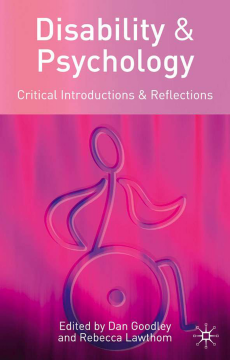
Additional Information
Book Details
Abstract
Disability is not just the physical, sensory or intellectual impairments a person has, but the exclusion from society they face as a result. Organisations for disabled people are a growing voice in challenging this exclusion and Anti-Discrimination legislation is helping to change the structures in society that have contributed to it.
This book examines the discipline of psychology in this regard. It argues that psychology has tended to ignore the socio-cultural aspects of disability and treat disabled people as objects rather than arbiters of psychological intervention. Bringing together disabled and non-disabled researchers and psychologists, this book proposes ideas for an enabling psychological theory and practice, and addresses questions such as:
" How can we support the inclusion of disabled children?
" Can therapy enable rather than pathologise?
" What can be learnt from the experience of disabled psychologists?
" How can psychology contribute to social models of disability?
In examining these issues, this volume challenges the reader to reconsider the relationship between disability studies and psychology and to do so in ways that contribute to the emancipation - rather than the exclusion - of disabled people.
A key text for students on relevant courses within Disability Studies and Psychology degrees, this book is also an important resource for those who study or work in the areas of healthcare studies, nursing, sociology and social work.
Dan Goodley is a Reader in Disability Studies, University of Sheffield, with research interests in disability theory, activism and methodology.
Rebecca Lawthom is Principal Lecturer in Psychology, Manchester Metropolitan University and a member of the Research Institute for Health and Social Change. Her research interests are in disability, community and feminist psychology.
DAN GOODLEY is Professor of Psychology and Disability at the Department of Psychology and Social Change, Manchester Metropolitan University, UK.
REBECCA LAWTHOM is a Senior Lecturer in Psychology at Manchester Metropolitan University, UK and the Interpersonal and Organizational Development Research Group in the Department of Psychology and Speech Pathology.
Table of Contents
| Section Title | Page | Action | Price |
|---|---|---|---|
| Cover | Cover | ||
| Contents | vii | ||
| List of Tables and Figures | ix | ||
| Acknowledgements | x | ||
| Notes on Editors and Contributors | xi | ||
| Preface | xv | ||
| 1 Disability Studies and Psychology: New Allies? | 1 | ||
| Part I: The Psychology of Disability: From Infancy to Adulthood | 17 | ||
| 2 Parents, Professionals and Disabled Babies: Personal Reflections on Disabled Lives | 19 | ||
| 3 Being in School? Exclusion and the Denial of Psychological Reality | 34 | ||
| 4 The Disability Discrimination Act and Lifelong Learning? Students with Disabilities and Higher Education | 42 | ||
| 5 Disabled and Graduated: Barriers and Dilemmas for the Disabled Psychology Graduate | 71 | ||
| 6 Disability and Old Age: Or Why It Isn't All in the Mind | 84 | ||
| 7 Towards a Psychology of Disability: The Emotional Effects of Living in a Disabling Society | 94 | ||
| Part II: Disability, Psychology and Practice: From a Disabling to an Enabling Psychology | 109 | ||
| 8 Against Stereotypes: Experiences of Disabled Psychologists | 111 | ||
| 9 Understanding Intellectually Disabled Clients in Clinical Psychology | 123 | ||
| 10 Enabling Practice for Professionals: The Need for Practical Post-Structuralist Theory | 141 | ||
| 11 Counselling with the Social Model: Challenging Therapy's Pathologies | 155 | ||
| 12 Doing Community Psychology with Disabled People | 170 | ||
| 13 Conclusions: Making Enabling Alliances between Disability Studies and Psychology | 187 | ||
| References | 205 | ||
| Index | 225 |
